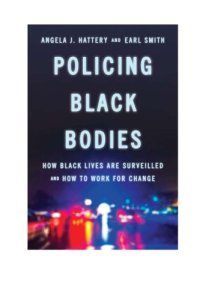
Ebook: Policing Black Bodies: How Black Lives Are Surveilled and How to Work for Change
Author: Angela J. Hattery Earl Smith
- Tags: racism, United States, police brutality, racial profiling, White supremacy
- Year: 2018
- Publisher: Rowman & Littlefield
- Language: English
- pdf
From Trayvon Martin to Freddie Gray, the stories of police violence against Black people are too often in the news. In Policing Black Bodies Angela J. Hattery and Earl Smith make a compelling case that the policing of Black bodies goes far beyond these individual stories of brutality. They connect the regulation of African American people in many settings, including the public education system and the criminal justice system, into a powerful narrative about the myriad ways Black bodies are policed.
Policing Black Bodies goes beyond chronicling isolated incidents of injustice to look at the broader systems of inequality in our society—how they’re structured, how they harm Black people, and how we can work for positive change. The book discusses the school-to-prison pipeline, mass incarceration and the prison boom, the unique ways Black women and trans people are treated, wrongful convictions and the challenges of exoneration, and more. Each chapter of the book opens with a true story, explains the history and current state of the issue, and looks toward how we can work for change. The book calls attention to the ways class, race, and gender contribute to injustice, as well as the perils of colorblind racism—that by pretending not to see race we actually strengthen, rather than dismantle, racist social structures. Policing Black Bodies is a powerful call to acknowledge injustice and work for change.
Angela J. Hattery is professor and director of women and gender studies at George Mason University. Her books include Intimate Partner Violence.
Earl Smith is emeritus professor at Wake Forest University. He is the author or editor of several books, including Race, Sport, and the American Dream. African American Families Today: Myths and Realities.
Policing Black Bodies goes beyond chronicling isolated incidents of injustice to look at the broader systems of inequality in our society—how they’re structured, how they harm Black people, and how we can work for positive change. The book discusses the school-to-prison pipeline, mass incarceration and the prison boom, the unique ways Black women and trans people are treated, wrongful convictions and the challenges of exoneration, and more. Each chapter of the book opens with a true story, explains the history and current state of the issue, and looks toward how we can work for change. The book calls attention to the ways class, race, and gender contribute to injustice, as well as the perils of colorblind racism—that by pretending not to see race we actually strengthen, rather than dismantle, racist social structures. Policing Black Bodies is a powerful call to acknowledge injustice and work for change.
Angela J. Hattery is professor and director of women and gender studies at George Mason University. Her books include Intimate Partner Violence.
Earl Smith is emeritus professor at Wake Forest University. He is the author or editor of several books, including Race, Sport, and the American Dream. African American Families Today: Myths and Realities.
Download the book Policing Black Bodies: How Black Lives Are Surveilled and How to Work for Change for free or read online
Continue reading on any device:

Last viewed books
Related books
{related-news}
Comments (0)